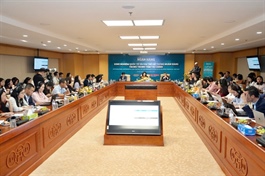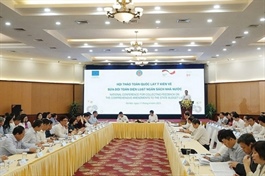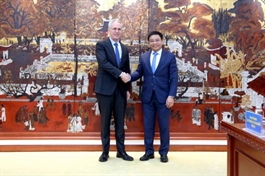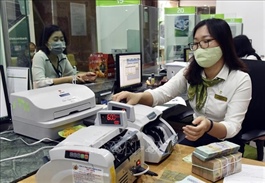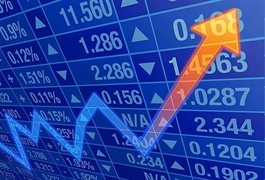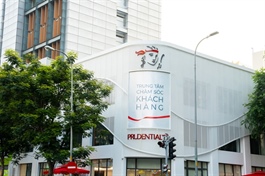Lending could increase amid volatile forex market
Lending could increase amid volatile forex market
Strong domestic growth is set to fuel a surge in lending, expected to pave the way for the State Bank of Vietnam to balance its policy tools and lay the groundwork for a further 0.03-0.08 per cent decline in average lending rates across the system.
The foreign exchange market continues to experience volatility, with the USD/VND exchange rate trending upward due to insufficient foreign investment inflows to offset foreign currency demand. Despite expectations that the US Fed may cut rates later this year, VND-denominated interest rates remain high, raising funding costs for businesses.
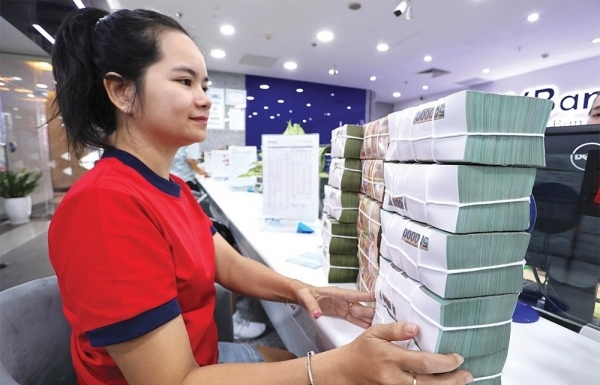
Exchange rate developments are currently complex and unpredictable, photo le Toan |
On April 6, during the government’s regular meeting for March, the State Bank of Vietnam’s (SBV) Governor Nguyen Thi Hong confirmed that the central bank had been closely monitoring President Trump’s tariff plans, noting its distinct nature compared to previous instances.
Governor Hong emphasised the complexity and unpredictability of exchange rate developments. “Some central banks have paused rate cuts, and major trade partners may at some point respond with their own tariffs. This will undoubtedly complicate global and domestic financial conditions, placing pressure on monetary, interest rate, and exchange rate policy management,” Hong said.
The Q2 Business Sentiment Survey conducted by the Monetary and Financial Stabilisation Department under the SBV in early April said, “In Q1, the average VND deposit interest rates across tenors slightly declined by 0.03-0.05 percentage points (ppts), while lending rates also dipped by 0.08-0.1 ppts from the previous quarter. These results contrast with prior expectations of modest increases of 0.14 ppts in deposit rates and 0.04 ppts in lending rates.”
Forecasts for Q2 and the full year of 2025 suggest that VND deposit rates across the banking system will remain stable in Q2, with only a marginal rise of 0.02 ppts for terms exceeding six months, and a 0.17 ppt increase for tenors of six months or less for the entire year.
“As for lending rates, credit institutions forecast a continued modest decline of 0.03–0.08 ppts for VND loans during Q2 and for the full year,” the SBV report said.
Speaking at a recent conference on encouraging credit growth, Mai Thi Trang, deputy director general of the SBV’s Monetary Policy Department, said the unpredictable US tariff plans placed significant pressure on exchange rate management, requiring a delicate balance between interest rate and exchange rate objectives.
“Nonetheless, the SBV remains committed to supporting credit institutions, including timely liquidity injections and maintaining stable policy rates to enable future reductions in lending rates,” Trang said.
She also urged credit institutions to continue implementing the SBV’s directives on reducing lending rates for businesses and households.
Dr. Vo Tri Thanh, a member of the National Financial and Monetary Policy Advisory Council, believed there is a chance to strengthen domestic production capacity in the long run to shield the economy from external shocks. “However, using interest rates to support growth under current conditions is challenging. Exchange rate and inflationary pressures are increasing, and loosening monetary policy carries significant risks,” Thanh said. “If we want to lower interest rates to assist businesses, we must carefully weigh the implications for the exchange rate and inflation.”
Tran Minh Hoang, head of Research and Analysis at Vietcombank Securities, stated that inflation, exchange rates, and interest rates remain well-managed, providing room for the SBV to use policy tools flexibly, even though the exchange rate may face short-term pressure.
“We maintain the view that inflation will remain under control, with the index projected to stay below critical thresholds. This is underpinned by consistent supply of essential goods and services and the government’s regulation of public utility prices.”
In response to the current environment, banks have introduced support programmes to help clients enhance operational efficiency amid rising uncertainty, particularly those involved in capital, currency, and international payment operations.
Eximbank drew attention on April 10 by unexpectedly raising interest rates across several tenors. However, the bank simultaneously reduced rates for more common tenors at the same time. In April, Eximbank launched a Trade Return programme, offering comprehensive incentives for customers using the bank’s international payment services.
In a bid to boost capital access and foster growth among individual business households and small-scale traders, VPBank launched one of the most attractive lending rate incentive programmes on April 10. The bank is offering secured business loans starting from 5.39 per cent per annum, a full 1 per cent reduction compared to previous rates, providing flexible financing opportunities for this rapidly expanding customer segment.
“This preferential secured loan package is not only a cash flow support solution, but also a growth catalyst enabling small businesses to scale operations and invest effectively,” a VPBank representative said.
- 07:00 17/04/2025




